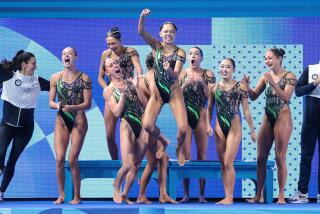Medley Winner Dolan Not Thin on Talent
- Share via
INDIANAPOLIS — As the U.S. Olympic swim team continues to fill its roster--eight more names were added based on Thursday night’s three finals at the week-long Olympic trials--the discussion has begun on just how the Americans look going into this summer’s Atlanta Games.
How do they look?
Hungry.
They look a little too lean and sinewy. To see 20-year-old University of Michigan junior Tom Dolan striding toward the starting blocks--all slouching shoulders and concave chest and pale, pale skin stretched over a 6-foot-6 frame--hardly was an early warning of what was to come.
Dolan swam the 400-meter individual medley (butterfly, backstroke, breaststroke, freestyle) in 4:12.72, within .42 of a second off his own world record, easing through the last 50 meters because “I really didn’t want to set the record tonight. I wanted to save up something for Atlanta.”
Dolan’s strength in the pool is an incongruous sight, given Dolan’s anemic appearance on land. And, in fact, his own health in recent months has raised the question as to whether he is on a quickening pace to swimming glory--or just collapse.
“All world-class swimmers train at a level of chronic fatigue,” said Dolan’s coach, Jon Urbanchek. “But we might have crossed the line into breakdown with Tom.” Beginning in January, Dolan began falling apart physically, to a point that Olympic swim coach Skip Kenney described as the “body actually cannibalizing itself . . . devouring muscle.”
The ‘90s euphemism for what was happening to Dolan’s body would be “downsizing.” Like the ‘90s trend, there still is no definitive truth that leaner necessarily means meaner. He may be the only American male to set a world swimming record since the 1992 Olympics, but his weight is a less-than-spindly 180 pounds, and the overtraining got him into real physical trouble this winter.
After a round of visits to doctors, Dolan--already bothered by asthma, allergies and a congenitally narrow windpipe--was forced to back off on training at the very time in his swimming career that he felt he needed more work. Mark Spitz, the seven-time gold medalist from 1972 who was in town Thursday, likened the temptation to overtrain in his sport to “trying to get a 200-watt bulb to give you 400 watts of light.”
Jessica Foschi put her troubles on hold to win the consolation final of the 200 freestyle, but the 15-year-old from Old Brookville, N.Y., has yet to qualify for the Atlanta Games after fighting for two months to participate in the trials.
She was fifth going into the first turn, moved up to second after three laps and barely overtook Kari Haag to win in 2:02.97.
Waiflike Cristina Teuscher, the high school senior from New Rochelle, N.Y., won the women’s 200-meter freestyle in 1:59.50.
UCLA senior Annette Salmeen of Ann Arbor, Mich., finished fourth in 2:01.18 to qualify for the U.S. Olympic freestyle relay team, becoming the first Bruin women’s swimmer to represent the United States at an Olympics since Tauna Vandeweghe, sister of Kiki, in 1976.
Kristine Quance, the USC junior from Northridge who was disqualified from her best event on a picky stroke ruling on Wednesday, bounced back with a second place in the 100 breaststroke (1:09.72) to win a trip to Atlanta after all.
Twiggyish 14-year-old Amanda Beard of Irvine, carrying to the starting blocks a fat-and-happy-looking teddy bear that dwarfed her all the more, won the women’s 100-meter breaststroke (1:08.36). Beard became the first 14-year-old to make the U.S. Olympic team since Nicole Kramer in 1976.
Meanwhile, back in fourth place in the 100 breaststroke, two places away from an Olympic berth, was none other than 19-year-old Anita Nall of Baltimore, who still holds the world record she set in the event when she was 15 but who, shortly after, went through her own bout of chronic fatigue. Nall’s coach, Murray Stephens, noted that Nall’s time (1:10.66) was her fastest in three years, and “finally something to hang her hat on.”
A maximum of 52 men and women--probably a smaller number, depending upon how many qualify in more than one event--out of 450 will make the Olympic team.
*
The Associated Press contributed to this story.
More to Read
Go beyond the scoreboard
Get the latest on L.A.'s teams in the daily Sports Report newsletter.
You may occasionally receive promotional content from the Los Angeles Times.






